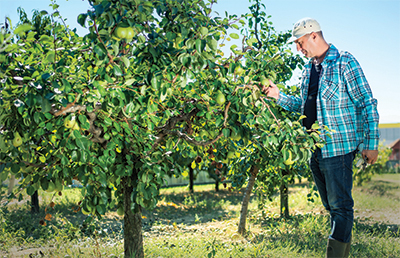Almonds Rhymes with Salmon

My oldest son went to college in Southern California and one of his friends that he met there was part of a family that raised almonds near Ripon, California. I always pronounced almonds with the emphasis on the Al, but I finally found out that almonds is supposed to be pronounced like it rhymes with salmon (at least according to them). The reason I bring this up is that the Tax Court yesterday released a case dealing with almond growers in California.
The family that owned the Jackson and Perkins roses business elected to sell about 3,200 acres of land near Wasco, California. The taxpayers in this case (there were three separate taxpayers involved) purchased the property for almost $30 million. Jackson and Perkins continued to rent part of the land to finish out the roses that were still on the property. To pay for the land and the almonds that were planted on the property, the taxpayers borrowed various funds from both Farm Credit and also did some intercompany loans.
The taxpayers elected to deduct all of the interest and real estate taxes paid regarding this property. The IRS audited each of the taxpayers and increased the taxable income of each partnership to reflect the capitalization of the interest and taxes. Normally, these expenses would be deductible, however, Section 263A requires farmers to capitalize almost all expenses associated with plants that have a preproductive life greater than 2 years (which almonds do).
The taxpayers argued that this provision did not apply to interest and taxes associated with the land since they did not “produce” the land, but rather produced almonds. That was a rather novel argument, but the Tax Court shot them down. The Tax Court also found that the related party loans required them to capitalize the interest that was paid to third parties that was then loaned to the taxpayers to grow the almonds. The Tax Court did find they did not have to capitalize all of the interest and real estate taxes, just the portion associated with growing the almonds.
Section 263A requires capitalization of these costs until it reaches commercial production which is usually around three to four years. There is a provision in Section 263A that allows taxpayers to elect to expense all costs related to preproductive costs. If taxpayers make this election, they then are required to use longer depreciable lives on all farm assets and can’t take bonus depreciation. However, there is a special provision for almond and citrus growers that require them to capitalize these costs for four years so that provision would not have helped these taxpayers.
The bottom line is that almost all costs associated with planting almonds have to be capitalized until they reach commercial production and remember that almonds rhymes with salmon.
Paul Neiffer is a certified public accountant and business advisor specializing in income taxation, accounting services, and succession planning for farmers and agribusiness processors. Paul is a principal with CliftonLarsonAllen in Walla Walla, Washington, as well as a regular speaker at national conferences and contributor at agweb.com. Raised on a farm in central Washington, he has been immersed in the ag industry his entire life, including the last 30 years professionally. Paul and his wife purchase an 180 acre ranch in 2016 and enjoy keeping it full of animals.

Comments are closed.